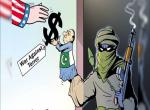Whatever the mode of engagement — war or diplomacy — nations interact to maximise their national interest. In adverse conditions, like defeat in war, they work to minimise their losses. The icing of ideology, morality, justice, global and human interest is often just trappings added to lend legitimacy and acceptability to what they mostly lack. The degree of success in furthering one’s national interests is determined by a nation’s comprehensive state power and the will and vision of its leadership to exercise it.
Notwithstanding its decisive edge in terms of state power, India has failed to further its interests vis-à-vis Pakistan. Without any legal or political locus standi it has allowed Pakistan to become a stakeholder in Kashmir. Despite being guilty of violating norms of international behaviour Pakistan has gone unpunished though its sponsorship of terrorism has led to thousands of deaths. Worse, it has constricted India’s options and forced it to the negotiating table in a position of weakness. Sharm-el-Sheikh is where Pakistan got away unscathed after the Mumbai carnage and inveigled India to the negotiating table.
On April 15, talking to the Editors’ Guild, Prime Minister Manmohan Singh pronounced that, “There won’t be any resumption of bilateral talks till Islamabad stops allowing terrorists to use its territory against India”. On July 16, he signed a joint statement with his Pakistani counterpart at Sharm-el-Sheikh agreeing that “India was ready to discuss all issues with Pakistan, including all outstanding issues” (read Kashmir) and lowering the focus on terrorism by stating that the “real challenge is development and poverty” (and not terrorism?). Only two inferences can be drawn from these apparently contradictory positions. First, Pakistan did something momentous between April 15 and July 16 that convinced India that Pakistani territory was no more being used for terrorism and that anti-India activities and consequently terrorism had ceased to be the central issue.
Drawing the right lessons
The Prime Minister’s assertion during the Chief Ministers conference on August 17 that, “Cross-border terrorism remains the most pervasive threat and there is credible information of ongoing plans of terrorist groups in Pakistan to carry out fresh attacks”, makes it obvious that this is far from correct. The other inference would be uncharitable, impinging upon his credibility and consistency. Prime ministers have, understandably, to work in the best interests of their countries even if that is at the cost of their personal image. The question, therefore, is not whether the Prime Minister has been credible and consistent, but whether he has been able to pursue the country’s Pakistan policy in its best interests. It is also important to examine whether we, as a nation, have drawn the right lessons and internalised them in formulating our national security and strategic doctrines. Countries that fail are destined to be punished by history.
The following are a few of the negatives of the Sharm-el-Sheikh communiqué in the context of India’s national interests:
The first point is that it put a lid over India’s pronouncements following 26/11 that, ‘all options were open’. In the wake of the groundswell of global condemnation Pakistan was seriously unnerved by India’s assertions. Apprehensions soared high. It was at this time that they took steps against Lashkar-e-Toiba leaders while making desperate pleas for restarting the stalled dialogue.
But the pressure was terminated at Sharm el-Sheikh. The joint statement mentioned that, “Both Prime Ministers recognised that dialogue is the only way forward”. The formulation that the prime ministers “considered the entire gamut of bilateral relations with a view to chartering the way forward in India-Pakistan relations” and agreed that the foreign secretaries “should meet as often as necessary and report to the two foreign ministers” who would meet on the sidelines of the forthcoming UN General Assembly, meant the stalled talks were restarted without any of India’s concerns being addressed. It is intriguing that on June 16, the Prime Minister told President Asif Ali Zardari in the Russian city of Yekaterinburg of his “limited mandate”, only to discuss how Islamabad can rein in terror. His later clarifications carried little conviction against the written words of the communiqué, particularly in the wake of statements that subsequently emanated from Pakistan. It sent the message that no matter how hard it was hit, today or tomorrow, India had no options but to talk and the brave words were meant only for a domestic constituency.
Respectable once again
Secondly, Pakistan’s intelligence agencies were let off the hook. The Prime Minister, addressing the Chief Ministers conference on Jan 6, had said that, “On the basis of investigations, there is enough evidence to show that, given the sophistication and military precision of the attack, it must have had the support of some official agencies in Pakistan.” On July 17, the Prime Minister made a U-turn, saying India does not accuse the current regime of “active involvement” in terror. In reply to a question, he asserted that, “There is a history to it. But it is certainly true that I am not accusing the present Pakistani government of active involvement”. Pakistan thus could once again demand to be treated as a respectable and responsible state. Its argument that even if some Pakistani nationals belonging to a terrorist outfit were involved, as a country it could not be held accountable, gained credence. The fact that Lashkar-e-Toiba is a creation and protégé of Pakistani intelligence got lost in the din.
Again, by bringing the two on a common pedestal on the terrorist front India has lost its diplomatic edge. By stating that “Both leaders agreed that terrorism is the main threat to both countries” and affirming, “Their resolve to fight terrorism and to cooperate with each other to this end,” Manmohan Singh allowed India to be equated with Pakistan. The reality is that while India for over two decades has been a victim of terrorism exported by Pakistan, leading to over 80,000 deaths, Pakistan is the victim of a self-inflicted injury caused by a jihadi agenda as an instrument of state policy to deal with India.
Fourthly, the formulation that Pakistan would “do everything in its powers” to “bring the perpetrators of the Mumbai attacks to justice” was the minimalist position with which India was surprisingly satisfied. There was no call to dismantle the infrastructure of terror, stop infiltration, return Indian nationals wanted in serious crimes from sanctuaries in Pakistan, large-scale smuggling of weapons, explosives, counterfeit currency from Pakistan, etc. There is no indication that India even raised these concerns. The formulation that “Prime Minister Gilani assured that Pakistan will do everything in its powers in this regard (Mumbai attacks)” sounds like a reluctant ritualistic formality rather than a commitment to action that India should have extracted or refused to have a joint statement at all.
One blunder after another
In the overall context of the bilateral relationship and the fact that the meeting was on the sidelines of an international conference, a joint statement was hardly needed. It must be on Pakistan’s insistence that, to deflect the focus from terrorism, “Both leaders agreed that the real challenge is development and the elimination of poverty”. It was advantage Pakistan as it wanted to marginalise terrorism.
Then, the reference to violence in “Balochistan” and “Other areas” in the context of terrorism is a historic blunder. It lends legitimacy to Pakistan’s unfounded accusations of India sponsoring terrorism in a neighbouring country. The reference to “other areas” gives Pakistan space to blame India for any terrorist action in its territory. India’s acceptance of a discourse substantially weakens its position. In future, whenever Pakistan is confronted with evidence of its terrorist activities, sabotage and subversion in Kashmir, it will counter with fabricated evidence on Balochistan. It will also use it to denigrate India through a malicious propaganda war internationally. The instrument will further be used to pressure India in Afghanistan and enlist Western support by extending the argument of Pakistan’s security as a precondition to fight the ‘West’s War’ against al-Qaeda and Taliban. That Pakistan is going to use this newfound weapon was obvious when in his first press conference after Sharm-el-Sheikh Prime Minister Gilani said that “The joint statement signed by me and Prime Minister Manmohan Singh underlines our concerns over India’s interference in Balochistan and other areas.” Manmohan Singh’s rejoinder that “If you have any evidence, we are willing to look at it because we are an open book; we are doing nothing. Therefore we are not afraid of discussing these issues”, has little meaning in this context. This is what Pakistan also can turn around and say probably with greater vigour, rejecting all evidence, to claim innocence.
National interest overlooked
Acceptance of the position that “Terrorism should not be linked to the composite dialogue process and these should not be bracketed”, militates against India’s interests. It implies that while Pakistan may continue to bleed India, India should continue with the talks and refrain from counter measures;
Non-mention of Kashmir to be acclaimed as an achievement is misleading. As Satish Chandra, former deputy National Security Advisor aptly puts it, “It is puerile to contend, as some have, that the ‘K’ word does not figure in the statement, as the phrase “outstanding issues” is shorthand for the same and forms part of the composite dialogue process”.
Why does Pakistan so desperately want to talk? It is aware that there are very few areas where the two countries could really have any meaningful partnership. It is Kashmir, which is central in Pakistan’s strategic and security calculus, that it wants to tackle through a two-pronged policy of use of covert action on one hand and dialogue on the other.
On Kashmir, India is a status quoist state. It has, wrongly, stopped pressing its claim over Pakistan-Occupied Kashmir. Having illegally occupied one-third of the state, Pakistan estimates that through terrorism, subversion in Kashmir, international machinations and now nuclear blackmail, it can extract concessions on Kashmir. Talks keep the issue open bilaterally, reinforce its character as an unresolved international dispute, retard India’s progress — which threatens to widen the gap between the state powers of the two countries — and commits Indian troops, enabling Pakistan to maintain effective parity in force levels at minimal cost. As a weaker power it cannot achieve these objectives militarily, so it resorts to low-cost covert action, ie, terrorism, sabotage, subversion. However reprehensible, Pakistan’s policy objectives and strategy are clear and it cannot be accused of being muddle headed.
But why does it want to hold talks? It is to minimise the attendant cost of hitting a powerful adversary and using instrumentalities which in today’s world invite international reprobation. It needs to be emphasised that covert action comes with a price tag, albeit with a difference — act now pay later. The cost is determined by the aggrieved party’s capacity and will to punish the delinquent and create international pressure that is unaffordable for the delinquent. Pakistan has perfected the art of synchronising and calibrating both aspects of covert action, leveraging variables on both fronts to its advantage. In the first, it recruits, trains, motivates, arms and uses terrorist groups to inflict maximum losses through acts of depredation. In the second, it manages the fallout by disclaiming its role, making loud pronouncements to its commitment to fight terror, projecting itself as a prime victim, highlighting the dangers of conflict between two nuclear states and using the dependence of its Western allies in the fight against terror to restrain India and demand resumption of dialogue. More importantly, it projects Kashmir as the core factor in the birth and proliferation of Islamic terror in Pakistan that now threatens the world. It wants the matter tackled in a way that de-emotionalises potential terrorists in the interest of global peace and safety. Talks are considered a means, for which it wants the support of the international community — which in effect implies pressuring India.
To India, through terrorist depredations it conveys the hard message of the cost of retaining Kashmir. It follows the principle that force against the adversary must be decisive to generate desired results but when it comes to the costs, it advances the principle that all contentious issues can only be resolved through peaceful methods and force provides no answer. So talks and preparations for the next attack go on concurrently. Musharraf’s assertion in his autography that “I would like to state emphatically that whatever movement has taken place so far in the direction of finding a solution to Kashmir is due considerably to the Kargil conflict” is indicative of this mindset. Despite military failure, Pakistani strategists saw Kargil not as a debacle but a success story vis-à-vis its policy objective.
Pakistan’s dangerous doctrine
Pakistan also feels that its nuclear possessions hedge it against the world allowing it to fall apart, whatever its follies. Both subtly and blatantly it works on a dangerous doctrine that the consequences of a failed nuclear Pakistan with an army of Islamic radicals would be unaffordable to the world as a whole. It estimates that it can exploit its unique setting to force the world not only to keep it going politically and economically but even provide it with strategic space vis-à-vis India and Afghanistan. Even the terrorists are concurrently seen as both liability and asset. Pakistan works on the premise that success in short time-frames is what is important. It’s the immediate that matters. Even the long-term framework is only the cumulative total of short-term actions and responses.
The West’s fear forces it to focus on the short term, foregoing the long-term strategic sites. It remains content with what little Pakistan delivers, at whatever cost. Even undermining India’s legitimate security concerns is an affordable cost as the personal ‘stakes are high’. This suits Pakistan but singles out and isolates India. It underlines the need for India to evolve an independent strategy to protect its sovereign interests.
Thus, there is a pattern and design in Pakistan’s strategy of strike-talk-strike. But when India allows itself to be sucked into this vicious spiral it defies reasoning. Following Kargil, Musharraf was asked by Gulf News, on June 15, 2003, if it could happen again. His reply: “We don’t trust India… Bilateral talks started only because of Kargil. Another Kargil would depend on how the peace talks proceed.”
When Pakistan struck Mumbai on July 11, 2006, killing more than 200 persons and injuring nearly 800 in seven serial blasts, an anguished Prime Minister asserted that “We are certain the terror modules are instigated, inspired and supported by elements across the border.” And what did Pakistan achieve? Within two months, at Havana India certified that Pakistan was not a terrorist-sponsoring state but a victim state. A “composite dialogue” was initiated, and ISI given a clean chit by asserting that “We must draw distinction between terrorist elements in Pakistan and the government of Pakistan”. No wonder it was hailed as a major success by Pakistan’s establishment, the dividend of July 11, 2006. Some day, Sharm-el-Sheikh will be acclaimed as a trophy of 26/11 by Pakistan.
Assumptions confirmed
If it had been serious about the peace process Pakistan would have unilaterally rolled back its terrorist infrastructure, handed over the Indian criminals provided sanctuary in Pakistan and stopped trans-border infiltration. Till that happens talks and diplomatic engagements will have to follow differently calibrated and nuanced formulations to change Pakistan’s India view. General Aziz Khan, former chairman, Joint Chiefs of Staff, addressing an army function in Rawalkot on June 24, 2003 had said “Pakistan not only knows how to tackle India but has leaders with the guts.” Sharm-el-Sheikh reinforces their belief in such assumptions.
The writer is a former director of the Intelligence Bureau.
Published in The New Indian Express dated : Sep 01 2009









Post new comment